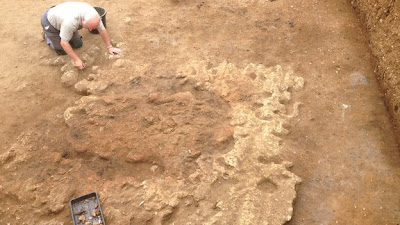Scientific Minds Want To Know
A 1,300-year-old bread oven could have been discovered by a group of volunteer archaeologists in Norfolk. |
| The suspected oven could have been used to provide bread for the community [Credit: BBC] |
Supervisor Dr John Jolleys said the clay object, which he believes to be a Saxon bread oven, was found about 4ft 11in (1.5m) underground.
"It's rare and very exciting," Dr Jolleys said.
Excavation of the object will continue for the remainder of the dig, which finishes on 16 August.
Dr Jolleys said there was a chance it could be a forge or pottery kiln, but there was no evidence of metal or discarded pottery.
'Community bread'
"Another thought was a corn drier," he said. "We had some burnt grain around it but that's all over the area and we suspect that relates to stubble burning."
There are signs that white clay which makes up the object had turned red due to being exposed to high heat.
"It looks very much like a bread oven," Dr Jolleys said. "Our initial thought was that it was Roman, but we've found a very nice, substantial piece of middle Saxon pottery dating between 650 and 850 sealed underneath a feature which is directly attached to the structure we've got."
The object was highlighted by a geophysical survey of the land, which also suggested there were objects either side of the potential bread oven.
"It suggests some organized activity, that this is bread making for a community rather than just for a household," Dr Jolleys said. "If that is so, there's a very strong possibility that Sedgeford is the center of an organized estate in the middle Saxon period."
Dr Jolleys said this could have been overseen by a lord of Sedgeford.
"When people start to settle down, the church comes in and starts organizing society and you get an emergence of local elite. There is somebody to organize how society runs and to organize production. There's a strong possibility that this is what we have here."

No comments:
Post a Comment